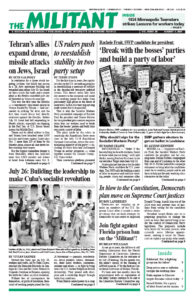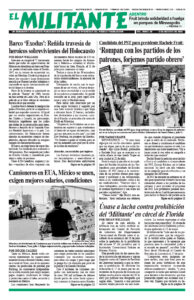After brutally suppressing political protests against his war in Ukraine, Russian President Vladimir Putin is now intensifying his crackdown on culture and artistic creativity. “Censorship and repression is now at levels resembling those in the post-Stalin years of the later 1950s and 1960s,” the Financial Times observed July 18. Poets, playwrights, artists, musicians and other cultural workers have been arrested, prosecuted and silenced.
One example is how a light-hearted novel about a zombie apocalypse in Moscow has attracted the wrath of Russian censors. Prosecutors have demanded that Ivan Filippov’s book Mouse must be withdrawn from sale across the country on the grounds that it threatens public order.
The novel is a satire about an infected rodent that escapes a secret lab where experts are developing a serum to prolong Putin’s life. In the ensuing chaos, most of Moscow’s residents turn into mouse-like zombies.
In April, Filippov was branded a “foreign agent,” a move by the regime to intimidate all opponents of the Russian government. After Putin’s full-scale invasion of Ukraine in 2022, Filippov left Russia to escape prosecution.
His Telegram channel in Russian protesting Putin’s war is called “Na Zzzzzapadnom fronte bez peremen,” which means “All quiet on the Wwwwwestern front.” This borrows from the title of a famous German 1929 anti-war novel by Erich Maria Remarque. It satirizes the “Z” painted on invading tanks and plastered all over the country as a symbol of Putin’s war on the Ukrainian people.
The administrators of the Erarta contemporary art museum in St. Petersburg were charged July 18 for the exhibit of a painting, part of the gallery’s collection since 2016, that authorities now claim contains “Nazi symbols.” The artwork by Belarusian artist Sergei Grinevich called “Festival” depicts dancers in national costumes performing behind three thuggish security guards.
The prosecutor’s objection is to a Belarusian phrase “Zyvie Bielarus!” (Long live Belarus!) graffitied under the painting, which has been there for four years. They claim it was used by pro-Nazi nationalist groups in World War II.
But the censors’ real objection is that the slogan was a rallying cry in 2020 for tens of thousands of working people in Belarus who protested against President Alexander Lukashenko, the pro-Putin incumbent who stole the presidential elections. With Moscow’s help, the Belarusian strongman put down the opposition in the streets.
Harsh sentences
In another example of the regime’s harsh assault on the arts, Yevgenia Berkovich, a prominent independent theater director, and playwright Svetlana Petriychuk were convicted July 8 on trumped-up terrorism charges over their award-winning play. They each were sentenced to six years in prison after being held in jail for over a year awaiting trial. They say their play was produced to depict the danger of terrorist groups like Islamic State. Putin’s censors say the play itself is terrorist. Their real crime was voicing opposition to the war in Ukraine.
As part of this crackdown, a growing number of young men and women who were arrested for protesting the war in Ukraine now face punitive, long prison sentences. Several of them are teenagers. One of the youngest, Valery Zaitsev, was 14 when he was arrested last year for voicing pro-Ukrainian sympathies. He now faces a prison sentence of from 15 years to life for “sympathizing” with “terrorists.”
Since he came to power in 1999, Putin, who rose to prominence after being an officer in the KGB, the Stalinist secret police, has increasingly tightened his grip on power. Both inside Russia — and in exile abroad — Russian artists are standing up and protesting his regime.
One young artist called Philippenzo, who is known for his political graffiti, was able to leave, even though the government had seized his passport. He has now opened an exhibit in Montenegro. He is wanted in Russia on charges of “vandalism motivated by political hatred.”
“To be honest, I can’t even object to this,” he told the Moscow Times, “because I really do hate the Putin regime.”
He is also taking part in a larger exhibit opening Aug. 3 in Amsterdam being put on by Artists Against the Kremlin. In the wake of Moscow’s 2022 invasion of Ukraine, simply telling the truth about that war has become illegal as “false news.”

